人教版新目标七年级下学期unit 12what did you do last weekend知识点
初中英语人教版七年级下册《Unit12 What did you do last weekend

2d Read the conversation and answer the 1q. IuH_t_eow_s_wa_t_iswo_g_na_rs_se_.La_it_s._a_’__s__w__e_ekend?
2. Where did Lisa work as a guide? A__t__th__e__N__a_t_u_r_a__l _H__is__to__r_y_____
4. Why is Paul tired now? B__e_c_a_u__s_e__h_e__s_t_a__y_e_d__u__p__la__t_e_to w__a_t_c_h__t_h__e__s_o_c_c__e_r_g__a_m__e__.___
2d Role-play the conversation.
New words
visitor
visitor可数名词,意为“游客” visit(v游玩;参观)+-or-- visitor(n游客 他是一位英国游客。 He is a British visitor. [拓展]act(v.表演)→ actor(n.男演员) invent(v.发明)→ inventor(n.发明家)
4. 谁bo去a探tin望g了. 她的奶奶? _W___h_o__v__is_i_t_e_d__h__e_r__g_r_a_n__d_m_ a? 5. 是蓓基。_B_e__c_k_y__d__id__.__
now. I
stayed up late to watch the soccer game.
Main points
1. How interesting!多么有趣啊!(教材第68页) 本句为how引导的感叹句,后面省略了it was 其结构是“How+adj./adv(+主语+谓语)!” 他们看起来多高兴啊! How happy they look! 她唱很多好呀! How well she sings!
人教版新目标七年级下册Unit 12What did you do last weekend Section B 2a 2b 教学设计

人教版新目标七年级下册Unit 12 What did you do last weekend?教学设计Section B 2a-2b一、教材分析本单元的话题是谈论周末活动,功能是能够理解使用一般过去时态谈论过去发生的事情。
Section A 通过Lucy的周末活动和听力输入导入单元话题及关键句型。
同时给出丰富的语言运用环境,帮助学生进行输入输出训练。
Section B是对Section A 的拓展,学生通过词汇及听力教学、阅读教学、写作教学完成从读的输入到写的输出。
本节课是Section B2a-2b,是一节阅读课。
本节课生词量大,其中重点生词18个(含动词过去式2个)、非重点生词4个、另外重点句型1个。
学生通过阅读Lisa在印度遭遇蛇的故事进一步输入目标语言。
巩固语言基础,开阔视野。
同时又为下节课的写作活动做好铺垫。
二、学情分析授课学生为七年级学生,班级学生60人。
调查发现:在学生阅读基础方面,100%的学生都有感到进行英语阅读很困难,其中, 66.7%的学生认为最影响他们对阅读内容的理解是生词,33.3%名学生认为是语法。
同时,66.7%名学生会查英语词典;在学习风格方面,93.3%名学生喜欢通过用图片、简笔画、视频、动作及游戏学习英语;生活体验方面,50%名学生害怕蛇,73.3%名学生有直面蛇的经历,93.3%名学生喜欢读惊险、刺激的故事。
学生需要教师对其进行词汇的分级学习指导,创设有意义的情境,用学生喜欢的学习方式如图片、简笔画、动作等学习词汇,促进学生对阅读内容的理解,提高他们的阅读能力。
三、教学目标知识目标:1.能认读下列词语:Taj Mahal;2.能认读、理解下列词语:tent, up and down, scared, scary;3.能够认读、理解并运用以下词语或句型:special, finish, ago, put up, surprise, move, shout to..., jump, India, moon, wake(woke)... up, forest, so...that...。
人教新目标版英语七下Unit 12《What did you do last weekend》(Pe
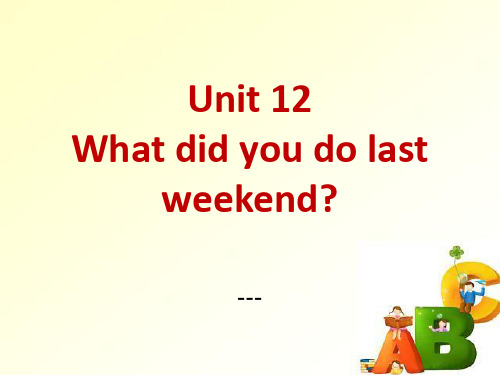
预习检测
三、请认真阅读2d对话,翻译下列句子。 24. 我在自然历史博物馆里做一名导游。(worked as) _I_w__o_r_k_e_d_a_s__a_g_u_i_d_e__a_t _th_e__N_a_t_u_r_a_l _H_is_t_o_r_y___ _M_u__s_e_u_m_.______________________________ 25. 多么有趣啊!(how) _H_o__w_i_n_t_e_re_s_t_in__g_! ________________________ 26. 我现在有点累。(kind of) _I_a_m___k_in_d__o_f_t_ir_e_d_n_o__w_.___________________ 27. 我通宵达旦地看足球比赛。(stayed up late to…) _I_s_t_a_y_e_d_u__p_l_a_te__to__w_a_t_c_h__th_e__s_o_c_c_e_r_g_a_m__e_. __
Unit 12 What did you do last
weekend?
---
学习重点
单词: camp, lake, beach, badminton, sheep, as, natural, butterfly, visitor, tired, stay
短语: stay up late, go camping, do homework, see a movie, go boating, go to the beach, on Sunday evening
预习检测
二、请认真阅读课本,找出以下短语。
12. 做作业__d_o_h_o_m__e_w_o_r_k____ 13. 去看电影_g_o__t_o_t_h_e_c_i_n_ema 14. 划船_g_o__b_o_a_ti_n_g______ 15. 在湖边搭帐篷_c_a_m_p__b_y__th_e__la_k_e_ 16. 去海滩_g_o__to__t_h_e_b_e_a_c_h__ 17. 打羽毛球_p_la_y__b_a_d_m__in_ton 18. 昨天晚上_la_s_t_n_i_g_h_t____ 19. 在星期六早上_o_n_S__a_tu_r_d_ay morning 20. 看望我的奶奶_v_is_i_t_m_y_ grandmother 21. 做运动_d_o__s_p_o_r_ts___ 22. 喂养绵羊_f_e_e_d_t_h_e_s_h_e_e_p_ 23. 星期天晚上_o_n_S__u_n_d_a_y evening
人教新目标英语七年级下册:Unit 12 What did you do last weekend?

Name Group ClassTitle: Unit 12 What did you do last weekend? Period 5 RevisionTopic: Talk about recent past events【Get ready before class】单元知识梳理1. 区分一般时、现在进行时、过去时的用法。
一般时:表示经常或客观的事情,动词用V原形;现在进行时表示现在正在发生的事,动词的用法是:be+V-ing;过去时指已经发生的事情。
动词用过去时V-ed。
2. 本单元重点学习一般过去时的特殊疑问句。
基本句型:特殊疑问词+助动词+主语+V原形+其他? e.g.:What did you do last weekend?3. 动词原形变为过去式规则:①一般情况加ed;如talk-talked ②以字母e结尾加d;die-died ③以重读闭音节结尾,双写尾字母加ed,如shop-shopped;④以y结尾,y前辅音,把y改i加ed,如study-studied;⑤不规则变形:详见课本不规则动词表。
单元词汇过关Section A(1a-3c)一、单词。
1. 扎营______2. 沙滩_____3. 湖泊____4. 自然的_______5. 羊________6. 蝴蝶_____7. 老鼠______8. 作为_________9. 游客_______ 10. 疲倦____ 11. 婴儿______ 12. 停留______二、词组。
1. 熬夜____________2. 打羽毛球____________3. 跑开____________4. 冲......大声叫嚷____________三、句子。
1.你昨天做了什么?我去划船了。
_____________________________________________2. 谁上周末去野营了?贝奇去了。
_____________________________________________3.她周六上午去哪里了?她去了一个农场。
新人教版初一七年级英语下册新版新目标七下Unit12What_did_you_do_last_weekend精品课件
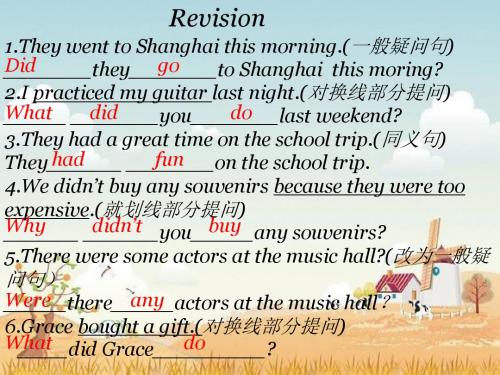
Let’s talk about past events.
Unit12
New words
1.camp /kQMP/v.扎营,搭帐篷
camp—camps-camping-camped 去野营 go camping
夏令营
summer camp
winter camp
ke /leIK/n.湖,湖泊
be tired of…. 对…厌烦 他们对他烦透了. They are tired of him.
11.stay /steI/v.停留,呆
stay in呆在家里
stay up late 深夜不睡,熬夜
stay at home 呆在家里
stay out 呆在户外 stay with sb 与某人暂住
New words
16.woof /wʊf/interj.(狗叫声)汪汪
nguage / ` lQNGWIdZ/n.语言
1.They love going to the_________( 海滩),swimming beach and surfing. sheep 2.There are a lot of_________( 绵羊)in the fields. 3.His book has been translated into more than 3 anguages l________. baby 4.A woman went into the room with a_______( 婴儿). mouse 5.The cat is watching the________( 老鼠). camping 6.They went________(camp)last weekend. visitors 7.There are a lot of_______(visit)in Beijing. tired 8.He is much too _______(tire)after hard work. 9.There were many_______(mouse)in the kitchen. mice help 10.Let me_______(help)you.
人教版新目标七年级英语下册 Unit 12单元测试(含答案)
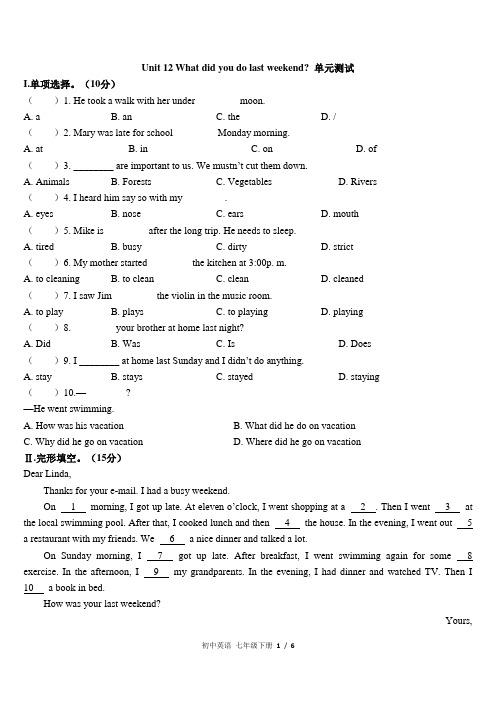
Unit 12 What did you do last weekend? 单元测试I.单项选择。
(10分)()1. He took a walk with her under ________ moon.A. aB. anC. theD. /()2. Mary was late for school ________ Monday morning.A. atB. inC. onD. of()3. ________ are important to us. We mustn’t cut them down.A. AnimalsB. ForestsC. VegetablesD. Rivers()4. I heard him say so with my ________.A. eyesB. noseC. earsD. mouth()5. Mike is ________ after the long trip. He needs to sleep.A. tiredB. busyC. dirtyD. strict()6. My mother started ________ the kitchen at 3:00p. m.A. to cleaningB. to cleanC. cleanD. cleaned()7. I saw Jim ________ the violin in the music room.A. to playB. playsC. to playingD. playing()8. ________ your brother at home last night?A. DidB. WasC. IsD. Does()9. I ________ at home last Sunday and I didn’t do anything.A. stayB. staysC. stayedD. staying()10.—________?—He went swimming.A. How was his vacationB. What did he do on vacationC. Why did he go on vacationD. Where did he go on vacationⅡ.完形填空。
人教新目标版七年级英语下册Unit12Whatdidyoudolastweekend(SectionA1a-2d)优质教案
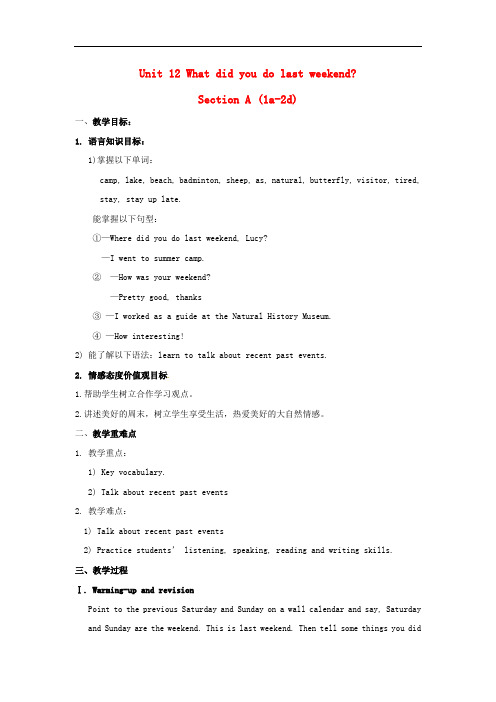
Unit 12 What did you do last weekend?Section A (1a-2d)一、教学目标:1. 语言知识目标:1)掌握以下单词:camp, lake, beach, badminton, sheep, as, natural, butterfly, visitor, tired, stay, stay up late.能掌握以下句型:①—Where did you do last weekend, Lucy?—I went to summer camp.②—How was your weekend?—Pretty good, thanks③—I worked as a guide at the Natural History Museum.④—How interesting!2) 能了解以下语法:learn to talk about recent past events.2. 情感态度价值观目标1.帮助学生树立合作学习观点。
2.讲述美好的周末,树立学生享受生活,热爱美好的大自然情感。
二、教学重难点1. 教学重点:1) Key vocabulary.2) Talk about recent past events2. 教学难点:1) Talk about recent past events2) Practice students’ listening, speaking, reading and writing skills.三、教学过程Ⅰ. Warming-up and revisionPoint to the previous Saturday and Sunday on a wall calendar and say, Saturday and Sunday are the weekend. This is last weekend. Then tell some things you didlast weekend such as,/ cleaned my house over the weekend. Use quick sketches (in the board along with gestures to demonstrate the meaning of each activity, Ⅱ. 1 a This activity introduces the key vocabulary.Focus attention on the picture. Ask students to tell what they see. Name each activity and ask students to repeat: did my homework, went to the cinema, went boating, camped by the lake, went to the beach, played badminton.Point out the numbered list of activities. Say each one again and ask students to repeat.Then ask students to match each activity with one of the pictures. Say, Write the letter of each activity next to the words. Point out the sample answer.Check the answers.Ⅲ. ListeningWork on 1bThis activity gives students practice in understanding the target language in spoken conversation.Point to the activities in the picture in activit y la. Ask students to tell what the person did in each picture. For example, She played badminton, or Lucy went to the ci nema. Play the recording the first time. Students only listen.Play the recording a second time. This time say. Listen to the recording and write the days and times Lucy did each thing under the pictures. Point out the sample answer under the picture of Lucy playing badminton; on Saturday morning.Correct the answers.Ⅳ. PairworkWork on 1cThis activity provides guided oral practice using the target language.Point to the example conversation. As k two students to read the dialogue to the class.Say, Now work with a partner. Student A, pretend to be Lucy. Student B, ask questions about what Lucy did on different days and times over the weekend. Talk about the activities in the picture.Students work in pairs. As they talk, move arou nd the room monitoring their work.Offer language or pronunciation support as needed,Ⅴ. ListeningWork on 2a:This activity gives students practice in understanding the key vocabulary in spoken conversation.Point to the five sentences and ask a student to read these sentences to the class.Say, You will hear recording of a conversation. The people will talk about some of the activities and people, but they will not talk about others. Please underline the words you hear on the recording.Play the recording the first time. Students only listen.Play the recording a second time. This time, ask students to underline each word that is said on the tap e. Point out the sample answer, grandmother.Correct the answers.1grandma 2 homework 3 English 4 farm 5 cowsⅥ. ListeningWork on 2b:This activity provides listening practice using the target language.Call attention to the pictures of Carol, Becky, and Jack and ask students to identify each person by name.Say, Now I will play the recording again. Listen to the students ta lking about what they did over the weekend. Write C for Carol, B for B Becky or J for Jack next to each statement in activity 2a. The first one has been done for you.Play the recording the first time. Students only listen.Point out the sample answer, S, in statement 1. Say, Sonia visited her grandmother.Play the recording again. Ask students to write a letter in front of each statement to show what each person did.Check the answers. B B C J JⅦ. Pair workAsk and ans wer in pairs.Point to the example conversation. Ask two students to read the dialogue to the class.Say, Now work with a partner. Student A, ask questions about what, who or where , Student B answers. Students work in pairs.Ⅷ. Role-play the conversation.1. Ask Ss to look at conversation in 2d. Then Ss read the dialogue by themselvesand find the answer to these questions:① What did Lisa do on her weekend?② What did Paul do on his weekend?2. Ss work in pairs and role-play the conversations.3. Have several pairs perform their conversations for the rest of the class. Homework:1. Copy new words twice.2. Write about what you did last weekend.板书设计:。
七年级英语下册《Unit12Whatdidyoudolastweekend(第4课时)》教案(新版)人教新目标版

Who did you go with?
What did you do?
Did you learn anything?
2. Ask two students to perform the dialogue to the class.
Walk around and offer help if needed.
Design of period
Period 4 Section B 3a-self check
Teaching Procedures
Teacher-student Interaction
Revise
Step IWarming- up and revision
1. Daily greeting.
2. Retell the article in 2b.
Point out the pictures and ask students to describe what they see.
Answer any question. students may the board and discuss its meaning.
Answer: did my this unit, complete the phrases in self check 1.Ask students do the exercise by themselves, then check the answer.
Unit12 What did you do last weekend?
Analysis of the Teaching Material
【Curriculum requirements】
人教版新目标七下unit 12 What did you do last weekend 全单元教案
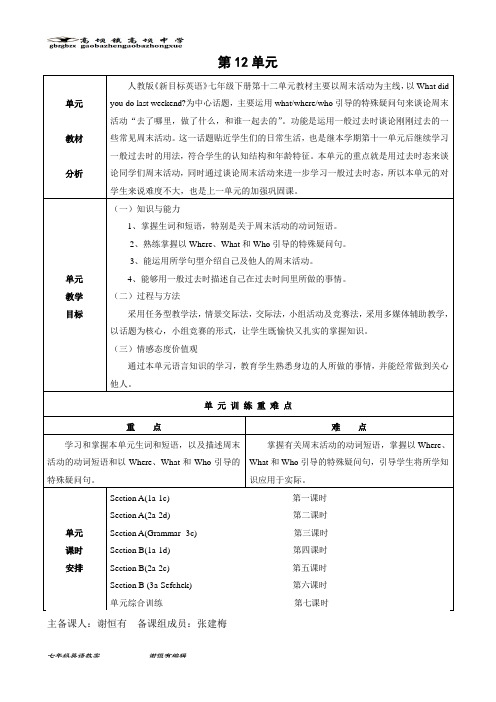
第12单元单元教材分析人教版《新目标英语》七年级下册第十二单元教材主要以周末活动为主线,以What did you do last weekend?为中心话题,主要运用what/where/who 引导的特殊疑问句来谈论周末活动“去了哪里,做了什么,和谁一起去的”。
功能是运用一般过去时谈论刚刚过去的一些常见周末活动。
这一话题贴近学生们的日常生活,也是继本学期第十一单元后继续学习一般过去时的用法,符合学生的认知结构和年龄特征。
本单元的重点就是用过去时态来谈论同学们周末活动,同时通过谈论周末活动来进一步学习一般过去时态,所以本单元的对学生来说难度不大,也是上一单元的加强巩固课。
单元教学目标(一)知识与能力1、掌握生词和短语,特别是关于周末活动的动词短语。
2、熟练掌握以Where、What和Who引导的特殊疑问句。
3、能运用所学句型介绍自己及他人的周末活动。
4、能够用一般过去时描述自己在过去时间里所做的事情。
(二)过程与方法采用任务型教学法,情景交际法,交际法,小组活动及竞赛法,采用多媒体辅助教学,以话题为核心,小组竞赛的形式,让学生既愉快又扎实的掌握知识。
(三)情感态度价值观通过本单元语言知识的学习,教育学生熟悉身边的人所做的事情,并能经常做到关心他人。
单元训练重难点重点难点学习和掌握本单元生词和短语,以及描述周末活动的动词短语和以Where、What和Who引导的特殊疑问句。
掌握有关周末活动的动词短语,掌握以Where、What和Who引导的特殊疑问句,引导学生将所学知识应用于实际。
单元课时安排Section A(1a-1c) 第一课时Section A(2a-2d) 第二课时Section A(Grammar -3c) 第三课时Section B(1a-1d) 第四课时Section B(2a-2c) 第五课时Section B (3a-Sefchek) 第六课时单元综合训练第七课时主备课人:谢恒有备课组成员:张建梅高坝中学课堂教学设计(电子教案)时间:2018年月日总第课时备课组:七年级英语课题Section A(1a-1c) 授课年级七年级( )班周次授课人教学目标知识与能力1.重点单词:camp, lake, beach, badminton2.重点短语:on Saturday morning,camp by the lake,go boating,go to the beach, play badminton3.重点句式:—What did you do last weekend, Lucy?—Well, onSaturday morning, I played badminton.过程与方法采用听力练习、对话练习等,熟练运用—What did you do lastweekend, Lucy?—Well, on Saturday morning, I played badminton.来谈论周末所做的事情。
人教新目标版英语七下Unit 12《What did you do last weekend》(Se

人教新目标版英语七下Unit 12《What did you do last weekend》(Section A 1a-2d)教学设计一. 教材分析人教新目标版英语七下Unit 12《What did you do last weekend》主要讲述了人们在上个周末所做的事情。
本节课的主要语言目标是让学生能够熟练地运用一般过去时询问和回答别人上个周末的活动。
教材中包含了丰富的图片和情境,使得学生能够在真实的情境中学习和使用英语。
二. 学情分析学生在学习本节课之前,已经掌握了一般过去时的基本知识,同时他们对上个周末的活动有一定的了解。
然而,学生在运用一般过去时进行问答方面还存在一定的困难,因此,教师需要通过不同的教学活动来帮助学生巩固和提高这方面的能力。
三. 教学目标1.知识目标:学生能够掌握一般过去时的基本结构,并能够熟练地运用一般过去时进行问答。
2.能力目标:学生能够在真实的情境中,运用所学的语言知识进行有效的沟通和交流。
3.情感目标:通过学习本节课,学生能够培养对英语学习的兴趣,提高他们的自信心。
四. 教学重难点1.教学重点:学生能够熟练地运用一般过去时进行问答。
2.教学难点:学生能够灵活运用一般过去时描述自己的上个周末的活动。
五. 教学方法本节课采用任务型教学法、情境教学法和交际法进行教学。
教师通过设计各种任务和情境,让学生在真实的语言环境中学习和使用英语。
同时,教师还采用分组合作、角色扮演等教学手段,激发学生的学习兴趣,提高他们的参与度。
六. 教学准备1.教师准备:教师需要提前准备教材、教学课件、图片等教学资源。
2.学生准备:学生需要提前预习教材,了解一般过去时的基本知识。
七. 教学过程1.导入(5分钟)教师通过向学生提问:“What did you do last weekend?”来引出本节课的主题。
然后,教师可以让学生分享他们的上个周末的活动,从而激发学生的学习兴趣。
2.呈现(10分钟)教师通过展示教材中的图片和情境,让学生感知和理解一般过去时的基本结构。
七年级英语下册Unit12Whatdidyoudolastweekend教案(新版)人教新目标版

9.跑开;逃走_______________ 10. shout at/to ____________________
11. study for the math test12. fly a kite ___________________
情感目标:热爱劳动,热爱大自然,体验美好生活。
重点
难点
重点:
1、一般过去时的判断及选用;日记的写法。
2、根据信息标志词判断一般过去时用法。
3、能灵活运用用实意动词的一般过去时描述或询问过去发生的事情。
4、学会能归纳动词过去式的变化规律,熟记部分规则动词和不规则动词的过去式。
难点:
1.一般过去时各种句式变化,尤其是实义动词的各种句式变化及用法。
1. Go through the sentences in2a& 2b.
2. Listen to2aand check the questions you hear.
Step7 Pair work: ask and answer:
1. Ask and answer questions with your partner. Finish2c.
教学目标
知识目标:
重点词汇: Camp, lake, beach, sheep, natural, tired, stay, shout, language, fly, high, ago, surprise, move, start, jump, wake, forest.etc.
重点词组:Stay up late, run away, shout at, fly a kite, work as, high school, put up, get a surprise, shout to, wake up. etc.
人教版新目标英语七年级下册《Unit12Whatdidyoudolastweekend》教学设计2

人教版新目标英语七年级下册《Unit 12 What did you do last weekend》教学设计2一. 教材分析人教版新目标英语七年级下册Unit 12 What did you do last weekend主要讲述了学生过去周末所做的事情,通过描述过去的行为来训练学生运用一般过去时进行交际。
本课主要介绍一般过去时的特殊疑问句及其回答,同时学习一些动词的过去式形式。
教材内容贴近学生生活,有利于激发学生学习兴趣,提高学生英语交际能力。
二. 学情分析七年级的学生已经掌握了基本的英语语法知识,对一般过去时有一定的了解。
但部分学生对动词过去式的构成和用法还不够熟练,需要通过大量的练习来巩固。
此外,学生的英语听说能力参差不齐,需要在教学中给予不同程度的学生适当的关注和指导。
三. 教学目标1.能听懂、会说、会读一般过去时的特殊疑问句及其回答。
2.能运用所学的动词过去式描述自己和他人的过去行为。
3.提高学生的英语交际能力和团队协作能力。
4.培养学生的英语学习兴趣,激发学生学习英语的积极性。
四. 教学重难点1.重点:一般过去时的特殊疑问句及其回答,动词过去式的运用。
2.难点:动词过去式的构成和用法,特别是易错动词的过去式。
五. 教学方法1.任务型教学法:通过设定各种实际情境,让学生在完成任务的过程中运用所学知识。
2.交际型教学法:鼓励学生积极参与课堂互动,提高学生的英语交际能力。
3.游戏教学法:通过趣味性强的游戏活动,激发学生的学习兴趣,巩固所学知识。
六. 教学准备1.教学PPT:制作含有本课重点内容的PPT,以便于课堂展示和教学。
2.教学卡片:制作动词过去式的卡片,用于课堂操练和游戏。
3.录音机和录音带:用于播放课堂所需的音频材料。
4.教学视频:准备相关的生活场景视频,用于课堂展示和拓展。
七. 教学过程1.导入(5分钟)利用教学视频展示不同学生周末的生活场景,引导学生谈论自己周末的所见所闻,从而引出一般过去时。
最新人教新目标版七年级英语下册 Unit 12 What did you do last weekend讲义 (新版)

Unit12 What did you do last weekendKey wordsPast tenseSentences:–What did you do last weekend?–I played soccer.–Who went to the library?–Sally did.–Where did she go last weekend?–She went to a farm.– What did you do there?– We went to a lot of museums.Pa ssage:Describe your last vacationUnit 12What did you do last weekend?Talk about past eventsGrammar:一般过去时(一般疑问句)重难点精讲单词camp, lake, beach, sheep, visitor, language, kite, surprise,snake, forest短语stay up late, run away, shout at, fly a kite, put up, get a surprise, shout to, up and down, wake…up, do homework, do some sports, study for a test, feed c ows, go camping, go to the beach,put up a tent, make a fire, each other, have dinner with friends,swim in the river, last weekend重点词汇和短语测一测: 下面的短语你都能写出来吗?A: What did you do last weekend?B: I …...A: What about your friend, …?B: She / He …... What did you do?A: I …...It’s important to arrange a weekend reasonably and meaningfully.Everyone should learn how to make the most use of time.题一:I had a busy weekend. On Saturday morning, I . In theafternoon, I ____ . It was a little difficult. On Saturday night, I stayed at home and __________ cook dinner.On Sunday morning, I ________________. I read a book about history. Then in the afternoon, I ___________with my friends. On Sunday night, I . I saw an interesting talk show.题二:A Weekend to RememberMy sister finished high school two weeks ago. As a special gift, our parents took us to India. Last weekend was interesting but scary.We went camping in a small village in India. First, we took a long bus ride to a lake in the countryside. There we put up our tents and made a fire to keep us warm and cook food on it. On the first night, we just sat under the moon and told each other stories. But I was so tired that I went to sleep early.The next morning, my sister and I got a terrible surprise. When we looked out of our tent, we saw a big snake sleeping near th e fire. I was so scared that I couldn’t move. We shouted to our par ents to let them know about the danger. My dad started to jump up and down in their tent.This woke the snake up and it moved into the forest near the lake. My dad told me later that snak es don’t have ears but can feel things moving. He also told me it was important not to go near a snake. This was a very useful lesson for me.Why did parents take them to India?How was last weekend?What did they do in the small village?Why did they make a fire?Why did they get a surprise?How do they feel?How can snakes hear things?What do they learn from the experience?题三:Where ______ your parents a moment ago?。
人教新目标英语七年级下册:Unit 12 What did you do last weekend?

Name Group ClassTitle: Unit 12 What did you do last weekend?Period 2 Section A (Grammar Focus -3c)Topic: Talk about recent past events.【Get ready before class】温故知新一、完成句子。
(B)1.在假期期间你做了什么?What _________ you do __________ vacation?2.他们周六晚上开了个晚会。
They _________ a party __________ Saturday evening.3.你的周末过得怎么样?___________ __________ your weekend?4.昨晚我没有看电视。
I _______ __________ TV last night.二、阅读下列对话,回答问题。
(C)Becky: What did you do last weekend, Lucy?Lucy: I visited my grandma with my mom.Becky: Did you visit your grandma for two days? Lucy: No, I just visited my grandma on Saturday. On Sunday, I studied for my English test.1. What did Lucy do on Sunday?.2. Where did Lucy go last weekend?.3. Who did she go with?.新知探究一、Listen and read the new words from Section A (Grammar Focus -3c). 预习生词,摘抄并翻译:单词所在的句子。
(A)run away: 原句翻译:shout at: 原句翻译:fly a kite: 原句翻译:language: 原句翻译:二、预习1a,并完成1a,1b的习题。
新版人教新目标版七年级英语下册Unit12WhatdidyoudolastweekendSectionB11a-2c教案
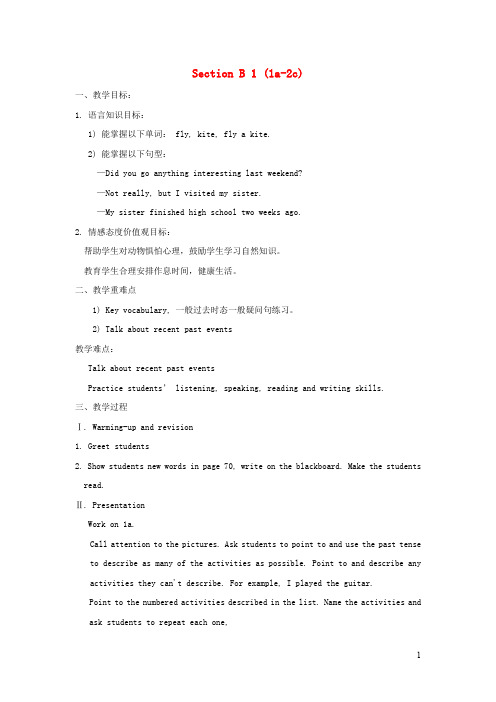
Section B 1 (1a-2c)一、教学目标:1. 语言知识目标:1) 能掌握以下单词: fly, kite, fly a kite.2) 能掌握以下句型:—Did you go anything interesting last weekend?—Not really, but I visited my sister.—My sister finished high school two weeks ago.2. 情感态度价值观目标:帮助学生对动物惧怕心理,鼓励学生学习自然知识。
教育学生合理安排作息时间,健康生活。
二、教学重难点1) Key vocabulary, 一般过去时态一般疑问句练习。
2) Talk about recent past events教学难点:Talk about recent past eventsPractice students’ listening, speaking, reading and writing skills.三、教学过程Ⅰ. Warming-up and revision1. Greet students2. Show students new words in page 70, write on the blackboard. Make the students read.Ⅱ. PresentationWork on 1a.Call attention to the pictures. Ask students to point to and use the past tense to describe as many of the activities as possible. Point to and describe any activities they can't describe. For example, I played the guitar.Point to the numbered activities described in the list. Name the activities and ask students to repeat each one,1。
人教新目标英语七年级下Unit12 What did you do last weekendSect
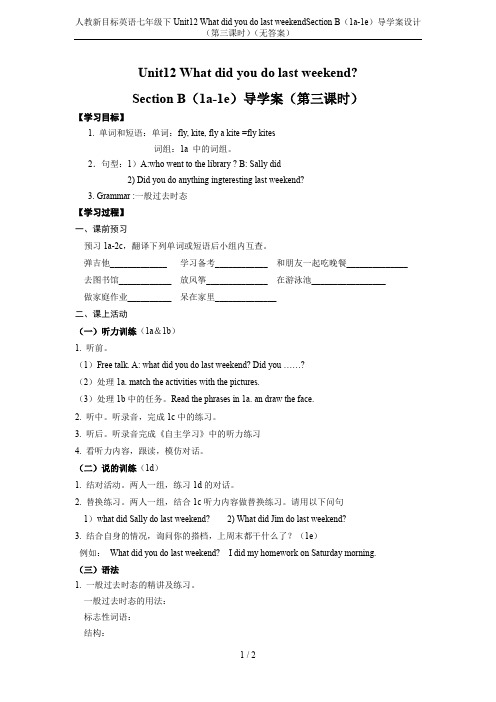
Unit12 What did you do last weekend?Section B(1a-1e)导学案(第三课时)【学习目标】1. 单词和短语:单词:fly, kite, fly a kite =fly kites词组:1a 中的词组。
2.句型:1)A:who went to the library ? B: Sally did2) Did you do anything ingteresting last weekend?3. Grammar :一般过去时态【学习过程】一、课前预习预习1a-2c,翻译下列单词或短语后小组内互查。
弹吉他_____________ 学习备考____________ 和朋友一起吃晚餐______________ 去图书馆____________ 放风筝______________ 在游泳池_________________做家庭作业__________ 呆在家里______________二、课上活动(一)听力训练(1a&1b)1. 听前。
(1)Free talk. A: what did you do last weekend? Did you ……?(2)处理1a. match the activities with the pictures.(3)处理1b中的任务。
Read the phrases in 1a. an draw the face.2. 听中。
听录音,完成1c中的练习。
3. 听后。
听录音完成《自主学习》中的听力练习4. 看听力内容,跟读,模仿对话。
(二)说的训练(1d)1. 结对活动。
两人一组,练习1d的对话。
2. 替换练习。
两人一组,结合1c听力内容做替换练习。
请用以下问句1)what did Sally do last weekend? 2) What did Jim do last weekend?3. 结合自身的情况,询问你的搭档,上周末都干什么了?(1e)例如:What did you do last weekend? I did my homework on Saturday morning.(三)语法1. 一般过去时态的精讲及练习。
- 1、下载文档前请自行甄别文档内容的完整性,平台不提供额外的编辑、内容补充、找答案等附加服务。
- 2、"仅部分预览"的文档,不可在线预览部分如存在完整性等问题,可反馈申请退款(可完整预览的文档不适用该条件!)。
- 3、如文档侵犯您的权益,请联系客服反馈,我们会尽快为您处理(人工客服工作时间:9:00-18:30)。
Unit 12 what did you do last weekend?Section A 知识讲解一. last(1)last形容词“最后的,最末的”或者“紧接前面的,刚过去的”。
Today is the last day in the year.最后一天。
I didn’t sleep well last night. 昨晚(2)last副词,“最后地”,I’m the last one.最后一个。
(3)last 动词,“持续,继续,维持”等,The hot weather lasted a week.持续了一周。
二. camp(1)camp 动词,“扎营,搭帐篷”。
We go camping every summer.We walked all day and camped by a river at night.(2)camp 名词,“露营地,度假营”。
Let’s go back to the camp, it’s getting dark. 让我们回营地吧,天黑下来了。
根据汉语提示填空。
(1)When did you join the ______ ______ (夏令营)?(2)I like ______ ______ (去宿营)in the open air.3)We______(宿营)in the forest last night. (4)Let’s go back to the ______(营地)三. sheepsheep 可数名词,“绵羊”,复数还是sheep;goat指山羊。
How many sheep are there on your farm? 你们农场里有多少只羊?拓展:常见的单复数同形的名词还有:deer (鹿),fish (鱼),Chinese (中国人),Japanese(日本人)等。
四. byby介词, “在……旁边”,相当于beside。
Our teacher is sitting by the window.by与交通工具名词连用时,名词前不用冠词,意为“乘、坐、用”等。
I went there by bike.五. “work as + 职业”意为“做某工作”。
埃里克在那家俱乐部里做音乐老师的工作。
Eric works as a music teacher in the club.as 实际上是... like实际上不是...He talks to me as a teacher. 他以老师的身份跟我谈话。
He talks to me like my teacher. 他像我的老师那样跟我谈话。
六. How interesting!(1)what引导的感叹句:1)What a(an)What a clever boy he is!多么聪明的小男孩啊!2)WhatWhat interesting books the children are reading!孩子们读的书多么有趣啊!3)What+形容词+不可数名词+主语+谓语!What cold weather it is!多冷的天!(2)how引导的感叹句:1)How+形容词或副词+主语+谓语!How lovely the baby is!这孩子真可爱!(lovely为形容词)How fast he runs! 他跑地多快啊!(fast为副词)2)How+形容词+a(an)+可数名词的单数形式+主语+谓语!How heavy a box they are carrying! 他们抬的箱子多重啊!3)How+主语+谓语!How time flies! 时间过得多快!七. stay up “熬夜;深夜不眠” 。
不要熬夜Don’t ________late. It’s bad for your health.stay up late to do sth. 熬夜做某事咱们别睡觉,迎接新年的到来吧。
Let’s __________to see the New Year.八. mouse “老鼠”,复数“mice”。
They saw two mice.九. language “语言”,可数名词。
English, Chinese and French are three different ________.十. shout at 大声喊叫;后面要跟人或事物Don’t _______the children.不要朝孩子们大声喊叫。
shout at sb. 多指因为生气等而非善意地对某人吼叫,shout to sb.冲某人大声喊叫。
多指因距离远而不得不大声叫喊。
He was so angry that he shouted _____ everyone.十一.visit v. visitor n. visit +sb.看望某人visit +sp.游览/参观某地(1) He is an English___________. (2) I _________my aunt last weekend. 十二away 的用法:away 副词,“远离;离开;消失”,常用短语有:far away (远离),go away (走开), run away (跑开,逃跑), right away (立刻,马上), away from (距…多远)。
根据汉语提示填空。
1. Tom, ______ ______ (远离)from here, please.2. It’s only 3 kilometers ______ ______(距…远) here.3. The giraffe ______ ______ (跑开) at once when he saw the tiger.4. He phoned his mother ______ ______(马上).Section B 知识讲解一. agoWe visited the Natural History Museum three days ago.【辨析】before 意为“在……之前”,一般不用于一般过去时,ago不具有这一功能。
They will come back be fore six o’clock.二. put upIt’s going to rain. Let's put up the tent. 天要下雨了,我们把帐篷搭起来吧。
2. 拓展:put upPlease help me put up the picture. 请帮我挂起这幅画。
If you know the answer, please put up your hands. 如果知道答案,请举手。
三.keep1. ”如: Please keep quiet / silent! 请保持安静!2. 抚养,饲养: keep chickens. 养鸡3. "遵守;维护"。
. Everyone must keep the rules. 人人必须遵守规章制度。
4. "使……保持某种(状态、位置或动作等)"。
这时要在构成复合宾语。
其中宾语补足语通常由形容词、副词、介词短语、现在分词和过去分词等充当。
如:形容词)我们应保持教室整洁干净。
副词)你最好让孩子离火远一点。
介词短语)坏天气使我们不能出门。
现在分词)别让我等太久。
过去分词)班上其他同学都闭着眼睛。
5. .keep away意为"(使)离开;(使)不接近",其后常接介词from。
如:Would you keep your dog away from my boy, please? 请把狗拉得离我孩子远点好吗?四. tired1. tired 形容词,tired 的反义词是tireless,意为“不知疲倦的”。
例如:He looks tired today. 他今天看起来很累。
She was tired of watching TV. 她看电视看得厌倦了。
这一天让人感到又累又长。
五.但是我太累了,所以早早就睡着了。
I was so scared that I couldn’t move.1. 英语中“so +形容词+that 句子”,表示“太……以至于……”。
2. 辨析so that / so…thatI got up early so that I could catch the early bus. 我早起是为了搭乘早班车。
2) so +形容词或副词+ that ...引导结果状语从句,意思是“如此……以致于……”。
例如:He runs so fast that nobody can catch up with him. 他跑得非常快,没人能追上他。
鲍是如此的懒以致于他不去上班。
Paul is so lazy that he doesn’t go to work.= Paul is too lazy to go to work.He is too young to go to school.= He is so young that he can’t go to school.2.He is such a clever boy that everybody likes him.他非常聪明,大家都非常喜欢他。
六. surprise:in surprise(惊奇), get a surprise (吃惊), to one’s surprise使某人惊讶的是2. surpriseThe news surprised us. 这条消息使我们吃惊。
3. 形容词形式: surprised,常用短语有I was surprised to see him there. 我真想不到会在那儿见到他。
The news is surprising. 新闻是令人惊讶的。
用surprise及其相关短语填空。
(1) What he did always ______ ______ 使我很惊讶 last year.(2) They found the TV over there ______ ______ (惊奇地).(3) ______ ______ ______ (使我惊讶的是), they’re all afraid of him.(4) I’m ______ ______ (惊讶) what he said.七. .look out of从……向外看1. Look out of the windows now. What can you see?现在请向窗外看。
你们看见什么啦?Look out!There's car coming.当心!汽车来了。
八. each other互相1. We often write to each other. 我们彼此经常通信.They look at each other's faces.他们望着彼此的脸。
